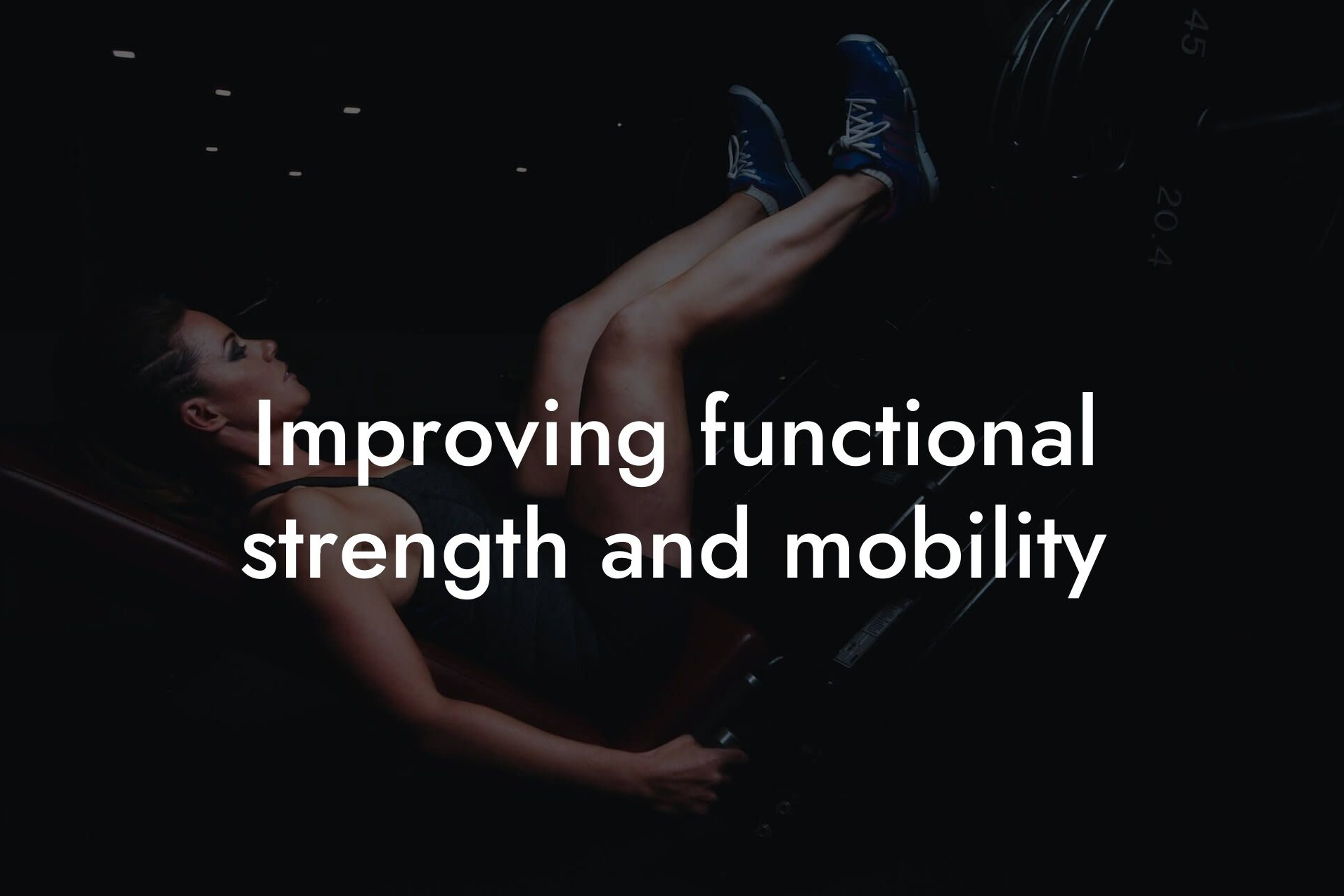Understanding DEXA Scans
A DEXA (Dual-Energy X-ray Absorptiometry) scan is a non-invasive, pain-free medical test that measures bone density, body composition, and fat distribution. It's a valuable tool for functional training athletes who want to optimize their performance, reduce injury risk, and improve overall health. In this article, we'll explore the benefits of DEXA scans for functional training athletes and how they can be used to take their training to the next level.
Table of Contents
What Do DEXA Scans Measure?
A DEXA scan provides a comprehensive assessment of an individual's body composition, including:
- Bone density: Measured in grams per square centimeter (g/cm²), bone density is an indicator of osteoporosis risk and overall bone health.
- Body fat percentage: Measured as a percentage of total body weight, body fat percentage is an indicator of overall health and fitness.
- Lean mass: Measured in kilograms (kg), lean mass includes muscle, bone, and other non-fat tissues.
- Visceral fat: Measured in square centimeters (cm²), visceral fat is a type of fat that surrounds internal organs and is associated with increased health risks.
Benefits for Functional Training Athletes
Functional training athletes, including those who participate in CrossFit, weightlifting, and high-intensity interval training (HIIT), can benefit from DEXA scans in several ways:
- Optimized training programs: By understanding their body composition and bone density, athletes can tailor their training programs to improve performance, reduce injury risk, and enhance overall health.
- Injury prevention: DEXA scans can identify areas of low bone density, which can help athletes take preventative measures to reduce the risk of fractures and other injuries.
- Improved body composition: Athletes can use DEXA scans to track changes in body fat percentage, lean mass, and visceral fat, allowing them to make informed decisions about their nutrition and training programs.
- Enhanced recovery: By understanding their body composition and bone density, athletes can develop targeted recovery strategies to improve overall health and performance.
How DEXA Scans Can Improve Performance
DEXA scans can provide functional training athletes with valuable insights that can be used to improve performance:
- Power-to-weight ratio: By understanding their lean mass and body fat percentage, athletes can optimize their power-to-weight ratio, leading to improved performance in activities such as weightlifting and gymnastics.
- Injury risk reduction: DEXA scans can identify areas of low bone density, allowing athletes to take preventative measures to reduce the risk of fractures and other injuries.
- Optimized nutrition: By understanding their body composition, athletes can develop targeted nutrition plans to support muscle growth, recovery, and overall health.
- Improved body mechanics: DEXA scans can provide insights into regional body composition, allowing athletes to develop targeted training programs to improve body mechanics and reduce the risk of injury.
Case Study: How DEXA Scans Helped a CrossFit Athlete
Meet Sarah, a 32-year-old CrossFit athlete who was struggling to improve her performance despite consistent training and nutrition. She underwent a DEXA scan, which revealed:
- A high body fat percentage (28%)
- Low bone density in her hips and spine
- A high percentage of visceral fat (130 cm²)
Armed with this information, Sarah worked with her coach to develop a targeted training program that focused on:
- Reducing body fat percentage through diet and exercise
- Improving bone density through strength training and calcium supplementation
- Reducing visceral fat through targeted exercises and nutrition
After six months, Sarah's DEXA scan results showed significant improvements:
- Body fat percentage decreased to 22%
- Bone density increased in her hips and spine
- Visceral fat decreased to 90 cm²
Sarah's performance improved significantly, and she was able to compete at a higher level in her next CrossFit competition.
How to Get a DEXA Scan
If you're a functional training athlete interested in getting a DEXA scan, here are your options:
- Visit a healthcare professional: Many healthcare professionals, including doctors and physical therapists, offer DEXA scans as part of their services.
- Use a DEXA scan machine at a gym or training facility: Some gyms and training facilities offer DEXA scans as part of their services.
- Visit a DEXA scan center: There are specialized DEXA scan centers that offer comprehensive body composition assessments.
DEXA scans are a valuable tool for functional training athletes who want to optimize their performance, reduce injury risk, and improve overall health. By understanding their body composition and bone density, athletes can develop targeted training programs, improve their nutrition, and enhance their recovery strategies. Whether you're a professional athlete or a recreational athlete, a DEXA scan can provide valuable insights that can help you take your training to the next level.
Get Started with Tano Performance Group
If you're interested in getting a DEXA scan and taking your training to the next level, contact Tano Performance Group today. Our team of experts will work with you to provide a comprehensive body composition assessment and develop a personalized training program tailored to your needs and goals.
Frequently Asked Questions
What is a DEXA scan, and how does it work?
A DEXA (Dual-Energy X-ray Absorptiometry) scan is a non-invasive, painless medical imaging test that measures bone density and body composition. It uses low-level X-rays to produce detailed images of the body's internal structures, providing accurate measurements of bone density, lean mass, fat mass, and visceral fat. This information helps functional training athletes optimize their training and nutrition for improved performance and overall health.
What are the benefits of DEXA scans for functional training athletes?
DEXA scans offer numerous benefits for functional training athletes, including accurate body composition analysis, tracking of progress over time, identification of muscle imbalances, and monitoring of bone density. This information enables athletes to tailor their training and nutrition to improve performance, reduce injury risk, and enhance overall health.
How does a DEXA scan differ from other body composition analysis methods?
DEXA scans are more accurate and comprehensive than other body composition analysis methods, such as bioelectrical impedance analysis (BIA) or skinfold measurements. DEXA scans provide detailed measurements of bone density, lean mass, and fat mass, as well as visceral fat, which is not possible with other methods.
What is the difference between lean mass and fat mass?
Lean mass refers to the amount of muscle tissue in the body, while fat mass refers to the amount of body fat. Understanding the balance between lean mass and fat mass is crucial for functional training athletes, as it can impact performance, recovery, and overall health.
How can DEXA scans help functional training athletes with weight loss?
DEXA scans can help functional training athletes with weight loss by providing accurate measurements of body fat percentage and visceral fat. This information enables athletes to create targeted nutrition and training plans to reduce body fat and improve overall health.
Can DEXA scans help identify muscle imbalances?
Yes, DEXA scans can help identify muscle imbalances by providing detailed measurements of lean mass in different areas of the body. This information enables functional training athletes to target specific muscle groups for improvement, reducing the risk of injury and enhancing overall performance.
How often should functional training athletes get a DEXA scan?
The frequency of DEXA scans depends on individual goals and needs. Generally, functional training athletes may benefit from regular scans (every 3-6 months) to track progress, adjust training and nutrition plans, and monitor for any changes in body composition.
Are DEXA scans safe?
Yes, DEXA scans are safe and non-invasive. They use low-level X-rays, which are significantly lower than those used in traditional X-rays. DEXA scans do not require any special preparation and are painless.
How long does a DEXA scan take?
A DEXA scan typically takes around 10-15 minutes to complete. During this time, you will lie on a table while the scanner takes detailed images of your body.
What should I wear for a DEXA scan?
It's recommended to wear loose, comfortable clothing that does not contain metal or other dense materials. You may also be asked to remove any jewelry or other items that could interfere with the scan.
Can I eat or drink before a DEXA scan?
It's recommended to fast for at least 2 hours before a DEXA scan to ensure accurate results. You can drink water, but avoid eating or consuming any caffeine or sugary drinks.
How do I prepare for a DEXA scan?
To prepare for a DEXA scan, avoid eating or drinking for at least 2 hours before the scan, wear loose, comfortable clothing, and remove any jewelry or metal items. It's also a good idea to consult with a healthcare professional or registered dietitian to discuss your goals and any specific questions or concerns you may have.
What happens during a DEXA scan?
During a DEXA scan, you will lie on a table while the scanner takes detailed images of your body. The scanner uses low-level X-rays to produce these images, which are then analyzed to provide accurate measurements of bone density and body composition.
How do I get the results of my DEXA scan?
The results of your DEXA scan will be provided to you by a healthcare professional or registered dietitian. They will explain the results in detail, highlighting areas of strength and weakness, and providing personalized recommendations for improvement.
Can DEXA scans help with injury prevention?
Yes, DEXA scans can help with injury prevention by identifying muscle imbalances and areas of weakness. This information enables functional training athletes to target specific areas for improvement, reducing the risk of injury and enhancing overall performance.
How do DEXA scans compare to other injury prevention methods?
DEXA scans are a more comprehensive and accurate method of injury prevention compared to other methods, such as biomechanical analysis or movement screens. DEXA scans provide detailed measurements of bone density and body composition, which can help identify potential areas of weakness and injury risk.
Can DEXA scans help with nutrition planning?
Yes, DEXA scans can help with nutrition planning by providing accurate measurements of body fat percentage and visceral fat. This information enables functional training athletes to create targeted nutrition plans to support their training goals and overall health.
How do DEXA scans help with bone health?
DEXA scans provide accurate measurements of bone density, which is essential for functional training athletes. By tracking bone density over time, athletes can identify any potential issues and take proactive steps to improve bone health and reduce the risk of injury.
Can DEXA scans help with overall health and wellness?
Yes, DEXA scans can help with overall health and wellness by providing accurate measurements of body composition and bone density. This information enables functional training athletes to make informed decisions about their training and nutrition, leading to improved overall health and wellness.
How does Tano Performance Group use DEXA scans?
Tano Performance Group uses DEXA scans as a valuable tool to support the training and nutrition plans of our clients. Our team of healthcare professionals and registered dietitians work with clients to interpret the results of their DEXA scan, providing personalized recommendations for improvement and tracking progress over time.
What is the cost of a DEXA scan?
The cost of a DEXA scan varies depending on the location and provider. At Tano Performance Group, we offer competitive pricing for DEXA scans, which can be discussed with one of our team members.
Is a DEXA scan covered by insurance?
Insurance coverage for DEXA scans varies depending on the provider and the specific policy. At Tano Performance Group, we can help you determine if your insurance plan covers DEXA scans and provide guidance on the process.
How do I schedule a DEXA scan with Tano Performance Group?
To schedule a DEXA scan with Tano Performance Group, simply contact us through our website or by phone. Our team will work with you to schedule a convenient time and answer any questions you may have.
Here are some related articles you might love...
- Nutrition strategies for functional training enthusiasts
- Improving functional strength and mobility
- Strength training tips specific to functional exercises
- The importance of bone density in functional fitness
- Preventing injuries in functional training: A comprehensive guide
- Balancing strength, speed, and flexibility in functional training
- Maintaining muscle recovery with functional training
- The role of body composition in functional training performance
- Reducing body fat for better functional training results
Zak Faulkner
Zak Faulkner is a leading authority in the realm of physical health and body composition analysis, with over 15 years of experience helping professionals optimise their fitness and well-being. As one the experts behind Tano Performance Group, Zak has dedicated his career to providing in-depth, science-backed insights that empower clients to elevate their physical performance and overall health.
With extensive knowledge of DEXA technology, Zak specializes in delivering comprehensive body assessments that offer precise data on body fat, muscle mass, bone density, and overall physique. His expertise enables individuals to make informed decisions and achieve their fitness goals with accuracy and confidence. Zak’s approach is rooted in a deep understanding of human physiology, combined with a passion for helping clients unlock their full potential through personalised strategies.
Over the years, Zak has earned a reputation for his commitment to excellence, precision, and client-focused service. His guidance is trusted by top professionals who demand the best when it comes to their health. Whether advising on fitness programs, nutritional strategies, or long-term wellness plans, Zak Faulkner’s insights are a valuable resource for anyone serious about taking their health and fitness to the next level.
At Tano Performance Group, Zak continues to lead our Content Team revolutionising how professionals approach their physical health, offering unparalleled expertise that drives real results.




